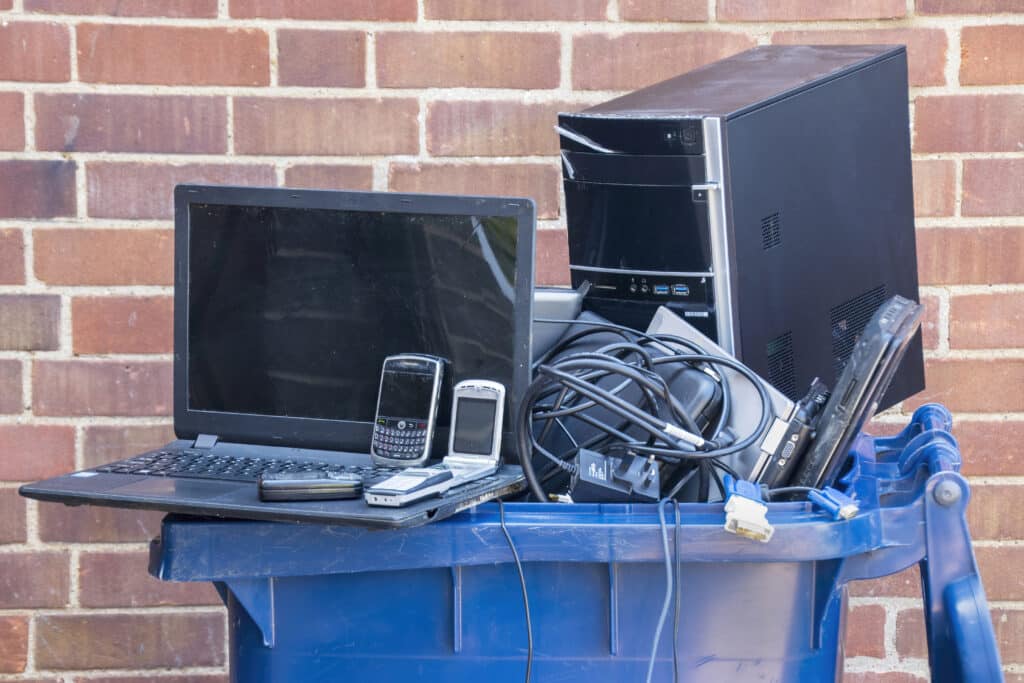Electronic waste (or e-waste) is one of the fastest-growing waste streams in the world. As companies upgrade their IT equipment, old devices pile up, and what happens next isn’t just an environmental concern, it’s a legal one. Many businesses don’t realize that improper disposal of electronics can lead to hefty fines and reputational damage. In this post, we’ll explore how e-waste laws affect your company, the risks of non-compliance, and how to properly manage your retired tech assets.

Understanding E-Waste and Its Risks
E-waste includes discarded electronics such as computers, servers, smartphones, monitors, printers, and networking equipment. These devices often contain hazardous materials like lead, cadmium, and mercury, which pose environmental and health risks if not handled properly.
Improper disposal not only pollutes landfills and water systems but also exposes your company to legal liabilities. Data left on discarded devices can lead to breaches, while failure to comply with local and federal regulations can result in fines or lawsuits.
Federal and State E-Waste Laws in the U.S.
There is no single federal e-waste law in the United States, but several federal regulations may apply depending on your industry. These include:
- Resource Conservation and Recovery Act (RCRA): Regulates the disposal of hazardous waste, including certain electronics.
- Health Insurance Portability and Accountability Act (HIPAA): For healthcare-related companies, HIPAA requires proper destruction of data on devices.
- Gramm-Leach-Bliley Act (GLBA): Financial institutions must properly secure and dispose of client data.
At the state level, e-waste laws vary widely:
- California: Businesses must comply with the Electronic Waste Recycling Act.
- New York: Enforces mandatory recycling through its Electronic Equipment Recycling and Reuse Act.
- Iowa: Encourages voluntary recycling and requires e-waste collectors to be certified.
Failing to follow these regulations can cost your company thousands in fines.
What This Means for Your Business
If your business handles electronics (and most do), you are responsible for their end-of-life management. Simply throwing an old computer in the trash or donating it without wiping the data could violate multiple laws.
Your responsibilities may include:
- Proper data destruction before disposal
- Using a certified e-waste recycling vendor
- Maintaining records of IT asset disposition
- Following industry-specific compliance laws
Common Compliance Mistakes Businesses Make
- Improper Data Destruction
Failing to wipe or destroy hard drives can lead to data breaches and legal penalties. - Unverified Recycling Vendors
Working with uncertified vendors may result in illegal dumping overseas or environmental violations. - Lack of Documentation
Not keeping records of what was disposed, when, and how can make proving compliance difficult. - Non-Compliance with Industry Laws
Healthcare, finance, and education sectors often have stricter rules. Ignorance isn’t an excuse.
How to Stay Compliant
- Conduct an E-Waste Audit
Identify what electronic devices are nearing end-of-life and where they are located in your organization. - Partner with a Certified Recycler
Look for R2- or e-Stewards-certified recyclers who follow best practices and provide Certificates of Destruction and Recycling. - Implement an IT Asset Disposition (ITAD) Policy
Create internal policies for when and how devices are decommissioned, wiped, and recycled. - Train Employees
Educate your staff on the importance of secure disposal and how to follow your ITAD policy. - Document Everything
Maintain detailed records of disposal, including serial numbers, dates, and certificates.
Benefits of Compliance Beyond Avoiding Fines
- Brand Reputation: Companies that demonstrate environmental and data responsibility build trust with clients.
- Cost Savings: Efficient ITAD policies can reduce storage, maintenance, and legal costs.
- Sustainability Goals: Compliant e-waste practices contribute to ESG reporting and green business certifications.
What to Look for in a Recycling Partner
- Certified by recognized standards (R2, e-Stewards)
- Offers secure data destruction
- Provides documentation for audits
- Experience with business clients and compliance needs
- Transparent processes and clear reporting
Ignoring e-waste laws doesn’t just risk fines—it threatens your business’s data, reputation, and environmental responsibility. By understanding the laws that apply to your company and building a strong IT asset disposition plan, you not only stay compliant but also contribute to a more sustainable future.
Need help getting started? Dymin offers secure, certified e-waste recycling for businesses of all sizes.
